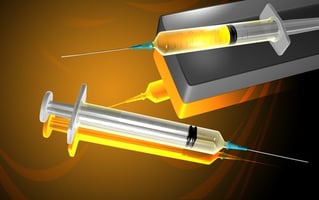The National Institute on Drug Abuse (NIDA) has issued a $5 million grant to Gary Matyas, Ph.D., to...
New Approach Raises Hope for Development of Heroin Vaccine
 |
“The result is efficient blockade of heroin activity in treated rats, preventing various features of drugs of abuse: heroin reward, drug-induced reinstatement of drug seeking, and reescalation of compulsive heroin self-administration following abstinence in dependent rats,” said Joel Schlosburg, Ph.D., and colleagues in the Proceedings of National Academies of Science, online May 6.
The vaccine has a low risk for long-term side effects because it does not affect opioid receptors or neurotransmitter function. It would also require “minimal medical monitoring and compliance." The vaccine may not be a “magic bullet,” said the authors, but it may someday prove to be useful adjunct therapy in treating heroin addiction in people.
For more in Psychiatric News about vaccines for drug addiction, click here.
(Image: Jeng Niamwhan/Shutterstock.com)




